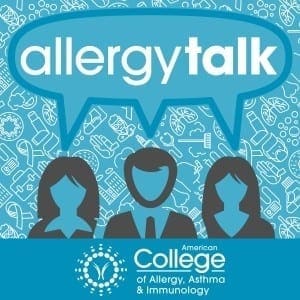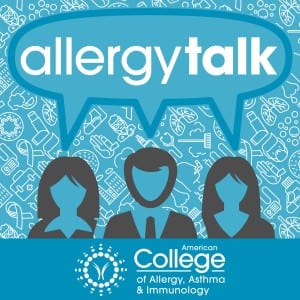This podcast is supported by Sanofi Regeneron.
Though severe pediatric asthma only represents from 2 to 5% of the children suffering with this condition, it represents a major share of the cost, resource utilization, and morbidity. It is important that allergists have a good gasp of this condition and how it differs from the adult population.
The third podcast in this three-part series covers beyond standard therapy, the role of current and future therapies including biologics.
Speakers are Gerald Lee, MD; William C. Anderson, III, MD; and Princess Ogbogu, MD.
Learning Objectives for the three-part series:
- Be able to discuss the burden of severe pediatric asthma and issues in optimal medication adherence in this population.
- Be able to evaluate the child with severe asthma and screen for corticosteroid overuse in and remedies to decrease it in this population.
- Be able to interpret the mechanisms of action, applicable pediatric population, dosing, outcome data, and adverse effects of current and future treatments beyond standard therapy in severe pediatric asthma.
References for the three-part series:
- Perry, R., Braileanu, G., Palmer, T. et al. The Economic Burden of Pediatric Asthma in the United States: Literature Review of Current Evidence. PharmacoEconomics, 37, 155–167 (2019).
- Yao T, Wang J, Chang S, et al. Association of Oral Corticosteroid Bursts With Severe Adverse Events in Children. JAMA Pediatr. Published online April 19, 2021.
- Katial RK, Bensch GW, Busse WW, Chipps BE, Denson JL, Gerber AN, et al. Changing paradigms in the treatment of severe asthma: the role of biologic therapies. J Allergy Clin Immunol Pract, 2017;5:S1–S14.
- Licari, A., Manti, S., Castagnoli, R. et al. Targeted Therapy for Severe Asthma in Children and Adolescents: Current and Future Perspectives. Pediatr Drugs, 21, 215–237 (2019).

Severe Pediatric Asthma Miniseries – Episode 3
ACAAI presents this podcast for educational purposes only. It is not medical advice or intended to replace the judgment of a licensed physician. The College is not responsible for any claims related to the procedures, professionals, products or methods discussed in the podcast, and it does not approve or endorse any products, professionals, services or methods that may be referenced.
